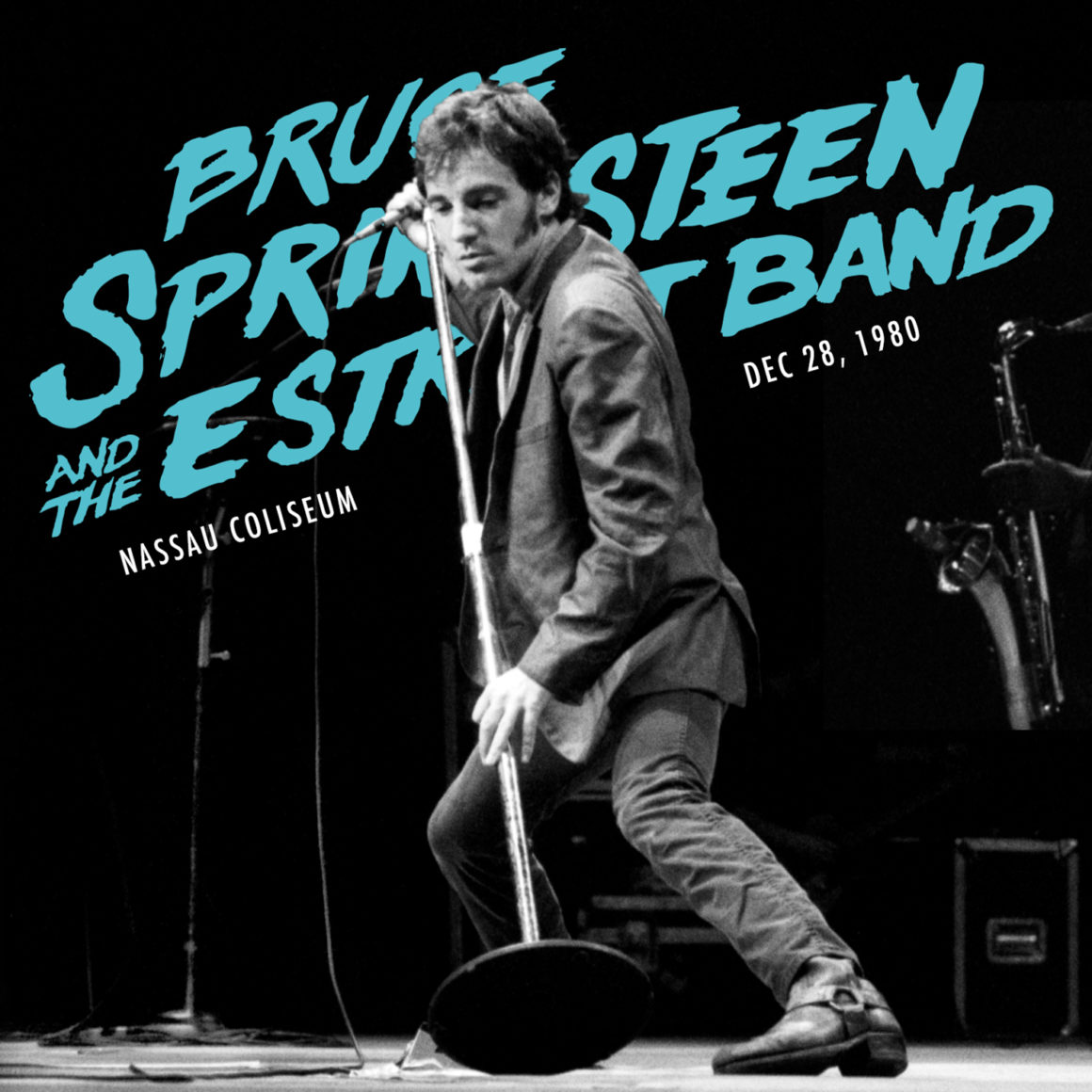
Bruce Springsteen and the E Street Band
LISTEN NOW: Nassau Coliseum, Uniondale, NY – December 28, 1980
By Erik Flannigan
The recently released recordings from 1979’s No Nukes concerts provide a riveting snapshot of a significant moment in time: the transition between 1978’s Darkness on the Edge of Town and 1980’s The River. The crackling electricity the No Nukes recordings emit is due in part to Springsteen packing the energy and excitement of a full show into a mere 90 minutes.
If the No Nukes set was a 13-song sprint, Nassau Coliseum 12/28/80 is a 33-track marathon, but a film analogy—16mm to 35mm—might be the more apt one. At an expansive 3 hours and 25 minutes, the River show captures Bruce and the E Street Band in widescreen, cinematic mode, in both scope and substance.
Given Springsteen was supporting his first double album and its 20 fresh songs, the River shows grew longer out of necessity. But the subject matter itself justified the expansion. “Independence Day,” “Stolen Car,” “Wreck on the Highway,” “Point Blank,” and “The River” are deep, narrative journeys, with Springsteen’s characters confronting existential questions and adulthood’s heaviest inflection points.
As a result, storytelling runs deeper and tone sustains longer in River shows than their predecessors. Songs like “Backstreets” and “Racing in the Street” were second-set emotional showstoppers in 1978, but contrast that with the somber trio of “Stolen Car,” “Wreck on the Highway” and “Point Blank” in the back half of 12/28/80 and there is no debate where lives are truly on the line. The Romances have given way to the Tragedies.
Like the album itself, River shows offer a compelling contrast between explorations of the dark recesses of human existence and life-affirming songs of release—a double feature, if you will, of Bergman and Capra. By way of example, Bruce follows the aforementioned trio of “Stolen,” “Wreck” and “Point” with a resuscitating take of “The Ties That Bind” when the audience needed reviving.
The expanded set also allowed Bruce to retain much of his key canon while still introducing an unprecedented amount of new music to his audience. Nassau 12/28/80 features 13 songs from The River while still carrying more than half of Born to Run, five songs and two outtakes from Darkness, key covers (“Who’ll Stop the Rain,” “Detroit Medley”), classics (“Rosalita,” “For You,” “Sandy”), and a couple of seasonal specials.
One of those, “Merry Christmas Baby,” gets the show off to a (holiday) spirited start, with Bruce channeling Otis Redding’s version in fine, lively voice and Clarence Clemons blowing a great saxophone solo.
Like most “special” shows, the telltale sign of Springsteen’s heightened, feeling-the-moment vocals can be found in many songs including excellent readings of “Darkness” and “Prove It All Night” in the first set, “For You” (such a fun first verse) and even “Ramrod” and “You Can Look” in the second set.
He’s feeling it—and who can blame him? The River just hit No. 1 on the Billboard Top 200, and Bruce was playing the first of three sold-out, impossible-ticket arena shows in his biggest market.
The delightful performance of “For You” in the second set yields to emotive guitar strumming, the prelude to a heart-rending “Stolen Car.” It’s a particularly spare and moving arrangement of one of the saddest songs in Springsteen’s catalog, wonderful to hear so faithfully played. Garry Tallent’s bass part on “Stolen Car” is one of his finest contributions ever.
The trilogy of tears continues with “Wreck on the Highway,” which manages to convey warmth and desolation at the same time. The E Street Band’s delicate touch serves the song well, with Roy BIttan’s piano and Danny Federici’s organ weaving counterparts, while Stevie Van Zandt’s guitar rings dolefully in the right channel. Hauntingly beautiful.
“Point Blank” completes the 20-minute trip through the heart of darkness, its narrative tone resigned and resolute but no less emotionally captivating. “Point Blank” is more overtly dramatic and emotionally detached than “Stolen Car” or “Wreck on the Highway,” which makes it a thrilling showpiece, rendered here with controlled bravado and sublime E Street musicianship.
While each Nassau concert stands on its own, the one song featured in 12/28/80 not played at the next two shows is “Backstreets.” Van Zandt offers novel fretwork in the song’s intro and brilliant playing throughout, distinguishing the River tour versions slightly but meaningfully from prior incarnations. Springsteen sings with full conviction and, together with Max Weinberg’s powerful drumming, “Backstreets” becomes the set’s thematic denouement and sonic crescendo.
A few other songs from the main set merit special mention. Creedence Clearwater Revival’s “Who’ll Stop the Rain” is played for only the third time ever, and the excellent Nassau version further cements the song’s status as a hand-in-glove fit with the E Street Band and one of their all-time best covers. Woody Guthrie’s “This Land Is Your Land” premiered this night, with Bruce telling the audience about reading Joe Klein’s book Woody Guthrie: A Life and reminding them that the song was written as “an angry answer to ‘God Bless America.’” We’re also treated to a unique “Hungry Heart” featuring Mark Volman and Howard Kaylan, better known as Flo & Eddie, recreating their background vocals from the studio version.
The final hour of Nassau is immensely satisfying, beginning with “Rosalita” followed by a delightful “Santa Claus Is Comin’ to Town” and “Jungleland,” chock full of those heightened Bruce vocals and a distinctive Van Zandt guitar solo, while the big Big Man smashes the first note and never wavers in his own solo spotlight. “Born to Run” and the “Detroit Medley” (including a long chunk of “I Hear a Train”) bring us home and conclude a quintessential River tour performance in all its cinematic glory.